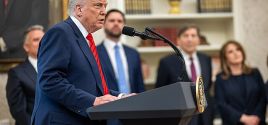Fury as fuel poverty soars close to a 10-year recordTim WebbThe Observer Jan. 28, 2008 |
Popular 
NYT: Trump Ended War With Houthis After They Shot Down U.S. Drones, Nearly Hit Fighter Jets

Ben Shapiro, Mark Levin and Laura Loomer Warn of Foreign Influence... From Qatar

Trump Advisor to Washington Post: 'In MAGA, We Are Not Bibi Fans'

Trump Cut Off Contact With Netanyahu Over 'Manipulation' Concerns, Israeli Reporter Claims

Trump Praises Houthis' 'Bravery'
 One in six British households is living in fuel poverty, the highest for almost a decade, according to new figures that threaten the government's target to eradicate the problem in England by the end of the decade. Fuel poverty is defined as when a household spends more than a tenth of its income on utility bills. The consumer group Energywatch said yesterday there are now about 4.4 million of these in the UK, with just over 3 million in England alone. Charities and other groups, led by the Association for the Conservation of Energy, are preparing a legal challenge in the next few weeks to force the government to meet the 2010 target, to which it is committed by law. The figures came at the end of a week in which the UK's largest energy supplier, British Gas, said it was increasing bills by 15 per cent. This month EDF Energy and Npower raised prices by up to 27 per cent, and two-thirds of British households will have to pay higher tariffs. Other suppliers are likely to follow suit soon. The regulator Ofgem's estimate of 4 million UK households living in fuel poverty in 2006 does not take into account the price rises announced this month. According to government figures, the last time there were as many fuel-poor households was in 1999 when the figure was 4.5 million. Numbers then fell until about 2005, when fuel poverty started increasing again. Despite the likelihood of meeting the 2010 target becoming ever more remote, last month the government was accused of underfunding its 'Warm Front' programme, which provides grants for poor households to insulate their homes. It allocated £800m until 2010 but a government quango, the Fuel Poverty Advisory Group, says £1.3bn is now needed. Gordon Brown will be embarrassed by the new figures. The Warm Homes and Energy Conservation Act was passed in 2000 committing the government to the legally binding targets of eradicating fuel poverty in England among the vulnerable - pensioners, the disabled and long-term ill - by 2010. By 2016-18, the government is committed to eradicating fuel poverty entirely across the UK. Its 2003 energy white paper made the issue one of its four principal goals. Yet in the most recent energy bill, published this month, the government made no mention of fuel poverty or how to tackle it. Energywatch wants the state to force suppliers to offer subsidised 'social tariffs' to poorer customers. But the government and Ofgem insist it is better to allow suppliers to offer these lower tariffs voluntarily. The Secretary of State for Regulatory Reform, John Hutton, defended the energy industry last week in the Commons. He pointed out it was spending £56m this winter to fund social tariffs. Yet the six largest energy suppliers made profits of £2bn in six months alone last year. According to a report last week from Energywatch, social tariffs only help one in 15 of those living in fuel poverty. Last week regulator Ofgem had to assure Brown it had found no evidence that companies were colluding to increase their prices. Andrew Johnstone, 45, from Dunfermline in Fife, lives in a four-bedroom bungalow with his wife, disabled daughter and son. As full-time carers, he and his wife are unable to work, and receive £179 income support per week. The Johnstones' electricity bill for the last six months was for £588, which they haven't been able to pay yet. Their last quarterly gas bill was £78. This means they spend more than 15 per cent of their income on energy, even before British Gas's latest price rise on Friday is factored in. 'It seems to be spiralling out of control,' said Mr Johnstone. |



